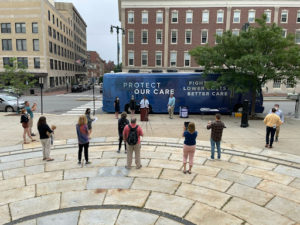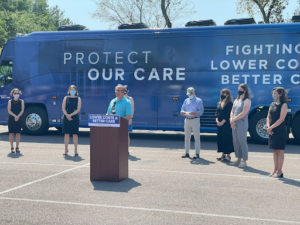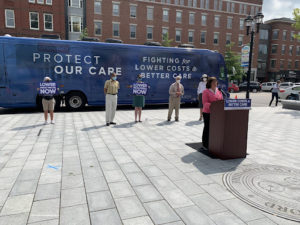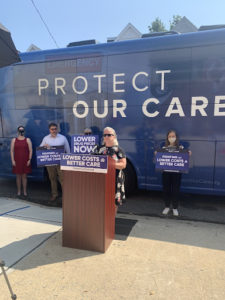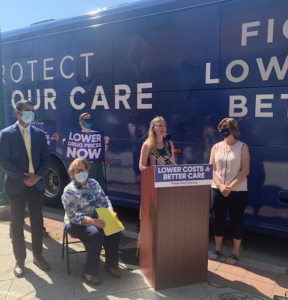HHS Secretary Becerra, U.S. Rep. Pallone, Jr. (D-NJ-06) and Health Care Advocates Joined Protect Our Care on the Nationwide “Lower Costs, Better Care” Bus Tour in New Brunswick to Demonstrate the Urgent Need to Lower the Cost of Prescription Drugs
You can watch the event here.

NEW JERSEY — This morning, Protect Our Care’s “Care Force One” arrived in New Brunswick to demonstrate the need for lowering health care costs, expanding coverage, and reducing racial disparities in care for New Jerseyans. Headlined by U.S. Health and Human Services Secretary Xavier Becerra and U.S. Representative Frank Pallone, Jr. (D-NJ-06), the event underscored the importance of addressing the skyrocketing cost of prescription drugs by giving Medicare the power to negotiate for lower drug prices.
Read Protect Our Care’s new report: Lower Costs, Better Care for New Jerseyans here.
Throughout the nationwide “Lower Cost, Better Care” bus tour, Protect Our Care is fighting to ensure critical health care measures supported by President Biden remain in the upcoming budget reconciliation legislation. These priorities include giving Medicare the power to negotiate for lower drug prices for all Americans, getting more Americans covered by closing the Medicaid gap, expanding Medicare benefits to include hearing, dental, and vision, and further reducing health care premiums for millions of Americans who purchase coverage on their own.
“Everyone wins when health care is in reach,” said HHS Secretary Xavier Becerra. “We know there is a need and demand for affordable care. Life-saving drugs shouldn’t eat up a person’s life savings. Lowering the cost of care and prescription drugs is a priority for the Biden-Harris Administration, and I am committed to advancing this goal.”
“Americans pay more for prescription drugs than any other country in the world, and as a result too many New Jerseyans do not take their medications because of high costs,” said Rep. Frank Pallone, Jr. (NJ-06), House Energy and Commerce Committee Chairman. “My legislation finally empowers the federal government to negotiate the cost of prescription drugs and make those prices available to both seniors on Medicare and Americans with private health insurance. Last week, the Senate passed a budget resolution that creates the framework for historic investments in health care and other social programs. I believe a key part of this package as it moves forward through Congress must be allowing the government to lower prescription drug prices. I’m grateful that Secretary Becerra joined me today in New Brunswick to see firsthand the momentum we are building for this bill. I’m looking forward to working with the Biden Administration to get it across the finish line.”
“I am proud to stand alongside our federal representatives and healthcare cost advocates as we call attention to the skyrocketing cost of prescription drugs,” said Assemblyman John McKeon from New Jersey’s 27th Legislative District and Chair, Financial Institutions and Insurance Committee. “Healthcare affordability is a uniquely American problem; we pay more for medications than any citizens in any other country in the world! Failure to address healthcare affordability is not an option.”
“Congressman Pallone has been a leader in the fight to lower New Jerseyans’ drug and premium costs, expand coverage, strengthen benefits for seniors and reduce racial disparities in care,” said Maura Collinsgru, Health Care Program Director, New Jersey Citizen Action. “We have a once in a generation opportunity to lower prescription drug costs while expanding access to more affordable health coverage and care for New Jerseyans and millions of Americans. We urge Congressman Pallone’s colleagues in the House and Senate to work tirelessly to ensure these long overdue measures become law this fall.”
“When I was fighting stage 4 cancer, I had to forego medication that would boost my immune system because the price tag was simply too high,” said Laura Packard, a cancer survivor and health care advocate who is crisscrossing the country on Care Force One this summer. “I wound up in the hospital, and nearly died. Sadly, stories like these are all too common in our country. Patients should be able to focus on getting well, not struggling to pay for medications. That’s why we need Congress to act now to lower the cost of prescription drugs, including allowing Medicare to negotiate prices on behalf of all Americans.”
“Instead of focusing on my health, I worry about how I’ll cover the price of my next prescription,” said Lisa Ann Trainor, a patient advocate who suffers from a chronic illness and shared her story about how high prescription drug costs have impacted her and her family. “We need change. Patients like me need our elected officials to take meaningful action to lower drug prices now. I can envision a reality where I would no longer be prevented from taking the medication I need because of its high price. I am grateful to Secretary Becerra and Congressman Pallone for fighting for legislation to allow Medicare to negotiate lower prices.”
“This tour is giving Americans from all walks of life the opportunity to speak out about the pressing need to lower health care costs and improve care,” said Brad Woodhouse, Executive Director of Protect Our Care. “New Jerseyans have the right to know whether their elected officials stand by President Biden’s agenda to improve health care for millions or if they side with Big Pharma and other special interests. Democrats like Congressman Pallone are fighting for the lower costs and better care that all Americans deserve. Care Force One is crisscrossing the country this summer making the case for getting this critical job done.”
Tomorrow, “Care Force One” will head to Willingboro, New Jersey, where Protect Our Care will be joined by State Senator Troy Singleton and other health care advocates. For more information, please visit protectourcare.org/bus-tour/.
The Protect Our Care “Lower Costs, Better Care” Bus Tour is making stops in:
Scranton, Pennsylvania on Monday, August 16, 2021
Burlington County, New Jersey on Tuesday, August 17, 2021
Wilmington, Delaware on Tuesday, August 17, 2021
Dover, Delaware on Tuesday, August 17, 2021
Morgantown, West Virginia on Wednesday, August 18, 2021
Pittsburgh, Pennsylvania on Wednesday, August 18, 2021
Youngstown, Ohio on Thursday, August 19, 2021
Columbus, Ohio on Thursday, August 19, 2021
Milwaukee, Wisconsin on Friday, August 20, 2021
Madison, Wisconsin on Friday, August 20, 2021
Parkersburg, West Virginia on Monday, August 23, 2021
Charleston, West Virginia on Monday, August 23, 2021
Raleigh, North Carolina on Tuesday, August 24, 2021
Charlotte, North Carolina on Tuesday, August 24, 2021
Columbia, South Carolina on Tuesday, August 24, 2021
Atlanta, Georgia on Wednesday, August 25, 2021
Savannah, Georgia on Wednesday, August 25, 2021
Orlando, Florida on Thursday, August 26, 2021
Tampa, Florida on Thursday, August 26, 2021
Denver, Colorado on Monday, August 30, 2021
Flagstaff, Arizona on Tuesday, August 31, 2021
Phoenix, Arizona on Tuesday, August 31, 2021
Tucson, Arizona on Wednesday, September 1, 2021
San Diego, California on Thursday, September 2, 2021
Anaheim, California on Thursday, September 2, 2021
Las Vegas, Nevada on Friday, September 3, 2021

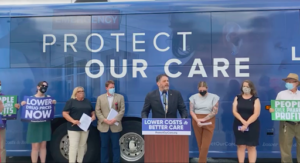
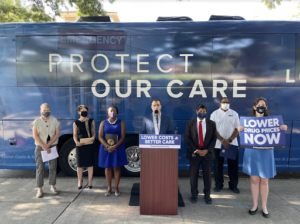 Coverage
Coverage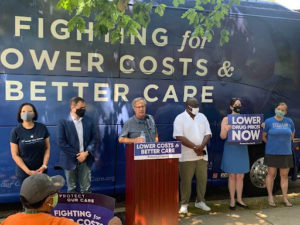
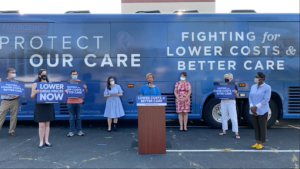

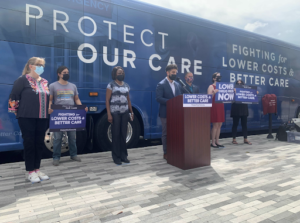
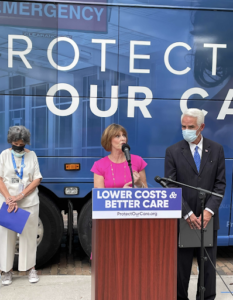
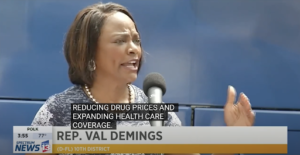
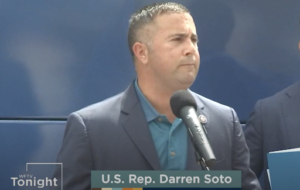




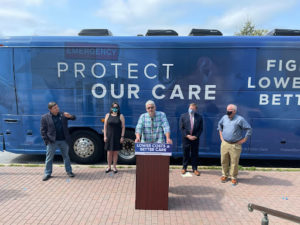 Coverage
Coverage